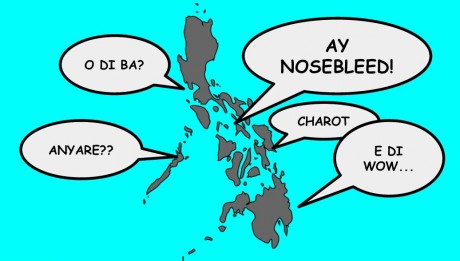Tagalog is a derivative of the Malay languages as Bahasa Indonesia and Bahasia Malaysia are. They are languages of experiences and emotions. They are NOT languages of the MIND as English, Spanish, German, French, etc, which are derivatives of Latin, are. Latin, in turn, derives its concept from Ancient Greek, which of course found its development through philosophy. Here, one can already see why Tagalog can’t be used efficiently to develop concepts and ideas. It falters miserably the moment it tries; the reason why Teddy Locsin saysTagalog is circular.
Just listen to Chiz Escudero, who uses a lot of Tagalog words. He appears to say many things, but in the end really says nothing. See, we don’t even have words for idea and concept. We translate them as “idea” (which we pronounce as ee-de-ya, just to make it sound Tagalog) and “konsepto”.

When the “nationalists”, the stupid kind, started pushing Tagalog in the academe, and we gave in, we started the mass bobo-zation of Filipinos. Not only have we cut out the students from the body of knowledge which we used to enjoy access to via Spanish and English, we removed from them a subconscious that is philosophical. Thus, emotion took precedence over intellect and thinking.
We see in current President Benigno Simeon Aquino one who exemplifies thisbobo-zation. As Sen Osmeña says, he is so hard-headed. People who closely work with him say he can’t understand things unless it is put to him in graphics. It is the experience and emotion that counts with him, not the hard work that is needed when one needs to think. He is comfortable with Tagalog in his speeches because it is the experience he needs, not the mind. And in an environment that is inside a bubble such as that experienced while living in a Palace, of course, that experience is detached from reality. Naturally, the president becomes delusional. He made this worse by exclusively using a speechwriter who was just a fresh graduate in 2010. He can’t use older speechwriters with depth and sense of history because that won’t be him; he is a fifty-year-old man with a brain of a teen-ager.
English foundationally depends on the verb “is”, which is the expression of “to be”. That comes from the Latin, ens and esse. “To be”, or the act of being, is the center of reality of Greek philosophy. “To exist”, one has “to be” first; that is the reality. The impact of recognizing “to be” on the subconscious assures one is operating profoundly in a reality that is real.
Something was lost in the translation from Greek to “esse”, and somewhat further lost when translated to “to be”. The confusion today is that there is no consensus on the certainty of reality. Some say reality depends on one what one thinks (Individualism); a product of Cartesian’s: Cogito, Ergo Sum (I think, therefore I am). Some say reality is what I will (Islam). Some say reality is what I feel (Aldub Nation). Some say reality is what I can use (Utilitarianism). Some say reality is where the money is (Materialism). Yet, deep inside us, we know we possess truth when we conform our mind to what is real, which is normally outside of us individually.
Yet, somewhere, English has not totally lost that reality based on the “act of being”. When we use English, “to be” remains embedded in the subconscious. Nothing like that can be said about Tagalog. How do we even translate: “to be or not to be, that is the question?” Ang pagiging o hindi pagiging, yan ang tanong? Hahaha. Even consider our word “ay”. Is it the best translation of “is”? But we also use “ay” in say, “ay naku”. So, are we embedding some reality in our mind when we use “ay”, or are we just confirming we are simply emotional creatures, and not intellectual? So, how can we even know our identity, if our “ay” has a hazy proposition with regards to reality?
We have to decide whether we want to continue thinking with our emotions, or not. Singapore had long ago decided. They had Malay, but they chose English because Malay is inefficient with its long, repetitive words. As Locsin rightly observes, it is circular. They even could have opted for Chinese, but chose English. They would have been okay with Chinese, as Chinese, even if it is just a sound-based language, is a very intellectual language in written form; the reason why Koreans and Japanese had to find a way to simplify the Chinese characters.
But, of course, we will never decide, because the oligarchs want a populace that is bobo-cized. See, they even use Kris Aquino to popularize Taglish, which is really gay talk. No wonder, the Philippines is all chuvaness: Filipinos that are all charot, and no balls. They eat like pigs because somehow they think they are just brutes with emotions; they live to eat, not eat to live. There was a time when Filipinos still spoke Spanish and English, that table manners and etiquette were quite important for them. Now, that too is gone. It is the most savage thing these ultra-nationalists inflicted on the country. In their paranoia and rush for uniqueness in the world, a search for self identity and dignity, they, in the end, attacked savagely the very identity and dignity they wanted to elevate. Why? Because Tagalog cannot be a national language. It is inherently a dialect of emotion, and that is all it is, and remains as such. Proud to be Filipino?????

No comments:
Post a Comment